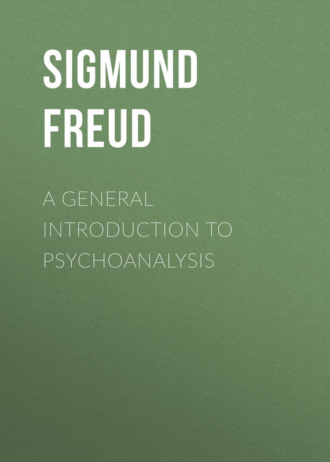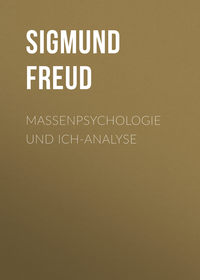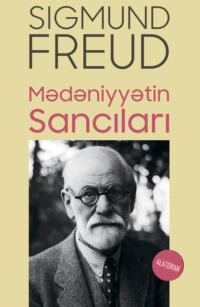 полная версия
полная версияA General Introduction to Psychoanalysis
I hope you will recognize the inevitability of the conclusion that it is the shocking character of these places in the dream that was the motive for their suppression. Yet where do you find a parallel for this state of affairs? In these times you need not seek far. Take up any political paper and you will find that the text is obliterated here and there, and that in its place shimmers the white of the paper. You know that that is the work of the newspaper censor. In these blank spaces something was printed which was not to the liking of the censorship authorities, and for that reason it was crossed out. You think that it is a pity, that it probably was the most interesting part, it was "the best part."
In other places the censorship did not touch the completed sentence. The author foresaw what parts might be expected to meet with the objection of the censor, and for that reason he softened them by way of prevention, modified them slightly, or contented himself with innuendo and allusion to what really wanted to flow from his pen. Thus the sheet, it is true, has no blank spaces, but from certain circumlocutions and obscurities of expression you will be able to guess that thoughts of the censorship were the restraining motive.
Now let us keep to this parallel. We say that the omitted dream speeches, which were disguised by a murmuring, were also sacrifices to a censorship. We actually speak of a dream censor to which we may ascribe a contributing part in the dream distortion. Wherever there are gaps in the manifest dream, it is the fault of the dream censor. Indeed, we should go further, and recognize each time as a manifestation of the dream censor, those places at which a dream element is especially faint, indefinitely and doubtfully recalled among other, more clearly delineated portions. But it is only rarely that this censorship manifests itself so undisguisedly, so naively one may say, as in the example of the dream of the "services of love." Far more frequently the censorship manifests itself according to the second type, through the production of weakenings, innuendoes, allusions instead of direct truthfulness.
For a third type of dream censorship I know of no parallel in the practice of newspaper censorship, yet it is just this type that I can demonstrate by the only dream example which we have so far analyzed. You will remember the dream of the "three bad theatre tickets for one florin and a half." In the latent thoughts of this dream, the element "precipitately, too soon," stood in the foreground. It means: "It was foolish to marry so early, it was also foolish to buy theatre tickets so early, it was ridiculous of the sister-in-law to spend her money so hastily, merely to buy an ornament." Nothing of this central element of the dream thought was evident in the manifest dream. In the latter, going to the theatre and getting the tickets were shoved into the foreground. Through this displacement of the emphasis, this regrouping of the elements of the content, the manifest dream becomes so dissimilar from the latent dream thoughts that no one would suspect the latter behind the former. This displacement of emphasis is a favorite device of the dream distortion and gives the dream that strangeness which makes the dreamer himself unwilling to recognize it as his own production.
Omission, modification, regrouping of the material, these, then, are the effects of the dream censor and the devices of dream distortion. The dream censorship itself is the author, or one of the authors, of the dream distortion whose investigation now occupies us. Modification and rearrangement we are already accustomed to summarize as displacement.
After these remarks concerning the effects of the dream censor, let us now turn to their dynamics. I hope you will not consider the expression too anthropomorphically, and picture the dream censor as a severe little manikin who lives in a little brain chamber and there performs his duties; nor should you attempt to localize him too much, to think of a brain center from which his censoring influence emanates, and which would cease with the injury or extirpation of this center. For the present, the term "dream censor" is no more than a very convenient phrase for a dynamic relationship. This phrase does not prevent us from asking by what tendencies such influence is exerted and upon which tendencies it works; nor will we be surprised to discover that we have already encountered the dream censor before, perhaps without recognizing him.
For such was actually the case. You will remember that we had a surprising experience when we began to apply our technique of free association. We then began to feel that some sort of a resistance blocked our efforts to proceed from the dream element to the unconscious element for which the former is the substitute. This resistance, we said, may be of varying strength, enormous at one time, quite negligible at another. In the latter case we need cross only a few intermediate steps in our work of interpretation. But when the resistance is strong, then we must go through a long chain of associations, are taken far afield and must overcome all the difficulties which present themselves as critical objections to the association technique. What we met with in the work of interpretation, we must now bring into the dream work as the dream censor. The resistance to interpretation is nothing but the objectivation of the dream censor. The latter proves to us that the force of the censor has not spent itself in causing the dream distortion, has not since been extinguished, but that this censorship continues as a permanent institution with the purpose of preserving the distortion. Moreover, just as in the interpretation the strength of the resistance varied with each element, so also the distortion produced by the censor in the same dream is of varying magnitude for each element. If one compares the manifest with the latent dream one sees that certain isolated latent elements have been practically eliminated, others more or less modified, and still others left unchanged, indeed, have perhaps been taken over into the dream content with additional strength.
But we wanted to discover what purposes the censorship serves and against which tendencies it acts. This question, which is fundamental to the understanding of the dream, indeed perhaps to human life, is easily answered if we look over a series of those dreams which have been analyzed. The tendencies which the censorship exercises are those which are recognized by the waking judgment of the dreamer, those with which he feels himself in harmony. You may rest assured that when you reject an accurate interpretation of a dream of your own, you do so with the same motives with which the dream censor works, the motives with which it produces the dream distortion and makes the interpretation necessary. Recall the dream of our fifty-year old lady. Without having interpreted it, she considers her dream abominable, would have been still more outraged if our informant had told her anything about the indubitable meaning; and it is just on account of this condemnation that the shocking spots in her dream were replaced by a murmur.
The tendencies, however, against which the dream censor directs itself, must now be described from the standpoint of this instance. One can say only that these tendencies are of an objectionable nature throughout, that they are shocking from an ethical, aesthetic and social point of view, that they are things one does not dare even to think, or thinks of only with abhorrence. These censored wishes which have attained to a distorted expression in the dream, are above all expressions of a boundless, reckless egoism. And indeed, the personal ego occurs in every dream to play the major part in each of them, even if it can successfully disguise itself in the manifest content. This sacro egoismo of the dream is surely not unconnected with the sleep-inducing cessation of psychic activity which consists, it should be noted, in the withdrawal of interest from the entire external world.
The ego which has been freed of all ethical restraints feels itself in accord with all the demands of the sexual striving, with those demands which have long since been condemned by our aesthetic rearing, demands of such a character that they resist all our moral demands for restraint. The pleasure-striving – the libido, as we term it – chooses its objects without inhibitions, and indeed, prefers those that are forbidden. It chooses not only the wife of another, but, above all, those incestuous objects declared sacred by the agreement of mankind – the mother and sister in the man's case, the father and brother in the woman's. Even the dream of our fifty-year old lady is an incestuous one, its libido unmistakably directed toward her son. Desires which we believe to be far from human nature show themselves strong enough to arouse dreams. Hate, too, expends itself without restraint. Revenge and murderous wishes toward those standing closest to the dreamer are not unusual, toward those best beloved in daily life, toward parents, brothers and sisters, toward one's spouse and one's own children. These censored wishes seem to arise from a veritable hell; no censorship seems too harsh to be applied against their waking interpretation.
But do not reproach the dream itself for this evil content. You will not, I am sure, forget that the dream is charged with the harmless, indeed the useful function of guarding sleep from disturbance. This evil content, then, does not lie in the nature of the dream. You know also that there are dreams which can be recognized as the satisfaction of justified wishes and urgent bodily needs. These, to be sure, undergo no dream distortion. They need none. They can satisfy their function without offending the ethical and aesthetic tendencies of the ego. And will you also keep in mind the fact that the amount of dream distortion is proportional to two factors. On the one hand, the worse the censorable wish, the greater the distortion; on the other hand, however, the stricter the censor himself is at any particular time the greater the distortion will be also. A young, strictly reared and prudish girl will, by reason of those factors, disfigure with an inexorable censorship those dream impulses which we physicians, for example, and which the dreamer herself ten years later, would recognize as permissible, harmless, libidinous desires.
Besides, we are far from being at the point where we can allow ourselves to be shocked by the results of our work of interpretation. I think we are not yet quite adept at it; and above all there lies upon us the obligation to secure it against certain attacks. It is not at all difficult to "find a hitch" in it. Our dream interpretations were made on the hypotheses we accepted a little while ago, that the dream has some meaning, that from the hypnotic to the normal sleep one may carry over the idea of the existence at such times of an unconscious psychic activity, and that all associations are predetermined. If we had come to plausible results on the basis of these hypotheses, we would have been justified in concluding that the hypotheses were correct. But what is to be done when the results are what I have just pictured them to be? Then it surely is natural to say, "These results are impossible, foolish, at least very improbable, hence there must have been something wrong with the hypotheses. Either the dream is no psychic phenomenon after all, or there is no such thing as unconscious mental activity in the normal condition, or our technique has a gap in it somewhere. Is that not a simpler and more satisfying conclusion than the abominations which we pretend to have disclosed on the basis of our suppositions?"
Both, I answer. It is a simpler as well as a more satisfying conclusion, but not necessarily more correct for that reason. Let us take our time, the matter is not yet ripe for judgment. Above all we can strengthen the criticism against our dream interpretation still further. That its conclusions are so unpleasant and unpalatable is perhaps of secondary importance. A stronger argument is the fact that the dreamers to whom we ascribe such wish-tendencies from the interpretation of their dreams reject the interpretations most emphatically, and with good reason. "What," says the one, "you want to prove to me by this dream that I begrudged the sums which I spent for my sister's trousseau and my brother's education? But indeed that can't be so. Why I work only for my sister, I have no interest in life but to fulfill my duties toward her, as being the oldest child, I promised our blessed mother I would." Or a woman says of her dream, "You mean to say that I wish my husband were dead! Why, that is simply revolting, nonsense. It isn't only that we have the happiest possible married life, you probably won't believe me when I tell you so, but his death would deprive me of everything else that I own in the world." Or another will tell us, "You mean that I have sensual desires toward my sister? That is ridiculous. I am not in the least fond of her. We don't get along and I haven't exchanged a word with her in years." We might perhaps ignore this sort of thing if the dreamers did not confirm or deny the tendencies ascribed to them; we could say that they are matters which the dreamers do not know about themselves. But that the dreamers should feel the exact opposite of the ascribed wish, and should be able to prove to us the dominance of the opposite tendency – this fact must finally disconcert us. Is it not time to lay aside the whole work of the dream interpretation as something whose results reduce it to absurdity?
By no means; this stronger argument breaks down when we attack it critically. Assuming that there are unconscious tendencies in the psychic life, nothing is proved by the ability of the subject to show that their opposites dominate his conscious life. Perhaps there is room in the psychic life even for antithetical tendencies, for contradictions which exist side by side, yes, possibly it is just the dominance of the one impulse which is the necessary condition for the unconsciousness of its opposite. The first two objections raised against our work hold merely that the results of dream interpretation are not simple, and very unpleasant. In answer to the first of these, one may say that for all your enthusiasm for the simple solution, you cannot thereby solve a single dream problem. To do so you must make up your mind to accept the fact of complicated relationships. And to the second of these objections one may say that you are obviously wrong to use a preference or a dislike as the basis for a scientific judgment. What difference does it make if the results of the dream interpretation seem unpleasant, even embarrassing and disgusting to you? "That doesn't prevent them from existing," as I used to hear my teacher Charcot say in similar cases, when I was a young doctor. One must be humble, one must keep personal preferences and antipathies in the background, if one wishes to discover the realities of the world. If a physicist can prove to you that the organic life of this planet must, within a short period of time, become completely extinct, do you also venture to say to him, "That cannot be so. This prospect is too unpleasant." On the contrary, you will be silent until another physicist proves some error in the assumptions or calculations of the first. If you reject the unpleasant, you are repeating the mechanism of dream construction instead of understanding and mastering it.
Perhaps you will promise to overlook the repulsive character of the censored dream-wishes, and will take refuge in the argument that it is improbable, after all, that so wide a field be given over to the evil in the constitution of man. But does your own experience justify you in saying that? I will not discuss the question of how you may estimate yourselves, but have you found so much good will among your superiors and rivals, so much chivalry among your enemies, so little envy in their company, that you feel yourselves in duty bound to enter a protest against the part played by the evil of egoism in human nature? Are you ignorant of how uncontrolled and undependable the average human being is in all the affairs of sex life? Or do you not know that all the immoralities and excesses of which we dream nightly are crimes committed daily by waking persons? What else does psychoanalysis do here but confirm the old saying of Plato, that the good people are those who content themselves with dreaming what the others, the bad people, really do?
And now turn your attention from the individual case to the great war devastating Europe. Think of the amount of brutality, the cruelty and the lies allowed to spread over the civilized world. Do you really believe that a handful of conscienceless egoists and corruptionists could have succeeded in setting free all these evil spirits, if the millions of followers did not share in the guilt? Do you dare under these circumstances to break a lance for the absence of evil from the psychic constitution of mankind?
You will reproach me with judging the war one-sidedly, you will say that it has also brought forth all that is most beautiful and noble in mankind, its heroic courage, its self-sacrifice, its social feeling. Certainly, but do not at this point allow yourselves to become guilty of the injustice which has so often been perpetrated against psychoanalysis, of reproaching it with denying one thing because it was asserting another. It is not our intention to deny the noble strivings of human nature, nor have we ever done anything to deprecate their value. On the contrary, I show you not only the censored evil dream-wishes, but also the censor which suppresses them and renders them unrecognizable. We dwell on the evil in mankind with greater emphasis only because others deny it, a method whereby the psychic life of mankind does not become better, but merely incomprehensible. When, however, we give up this one-sided ethical estimate, we shall surely be able to find a more accurate formula for the relationship of the evil to the good in human nature.
And thus the matter stands. We need not give up the conclusions to which our labors in dream interpretation lead us even though we must consider those conclusions strange. Perhaps we can approach their understanding later by another path. For the present, let us repeat: dream distortion is a consequence of the censorship practised by accredited tendencies of the ego against those wish-impulses that are in any way shocking, impulses which stir in us nightly during sleep. Why these wish-impulses come just at night, and whence they come – these are questions which will bear considerable investigation.
It would be a mistake, however, to omit to mention, with fitting emphasis, another result of these investigations. The dream wishes which try to disturb our sleep are not known to us, in fact we learn of them first through the dream interpretation. Therefore, they may be described as "at that time" unconscious in the sense above defined. But we can go beyond this and say that they are more than merely "at that time" unconscious. The dreamer to be sure denies their validity, as we have seen in so many cases, even after he has learned of their existence by means of the interpretation. The situation is then repeated which we first encountered in the interpretation of the tongue slip "hiccough" where the toastmaster was outraged and assured us that neither then nor ever before had he been conscious of disrespectful impulse toward his chief. This is repeated with every interpretation of a markedly distorted dream, and for that reason attains a significance for our conception. We are now prepared to conclude that there are processes and tendencies in the psychic life of which one knows nothing at all, has known nothing for some time, might, in fact, perhaps never have known anything. The unconscious thus receives a new meaning for us; the idea of "at present" or "at a specific time" disappears from its conception, for it can also mean permanently unconscious, not merely latent at the time. Obviously we shall have to learn more of this at another session.
TENTH LECTURE
THE DREAM
Symbolism in the DreamWE have discovered that the distortion of dreams, a disturbing element in our work of understanding them, is the result of a censorious activity which is directed against the unacceptable of the unconscious wish-impulses. But, of course, we have not maintained that censorship is the only factor which is to blame for the dream distortion, and we may actually make the discovery in a further study of the dream that other items play a part in this result. That is, even if the dream censorship were eliminated we might not be in a position to understand the dreams; the actual dream still might not be identical with the latent dream thought.
This other item which makes the dream unintelligible, this new addition to dream distortion, we discover by considering a gap in our technique. I have already admitted that for certain elements of the dream, no associations really occur to the person being analyzed. This does not happen so often as the dreamers maintain; in many cases the association can be forced by persistence. But still there are certain instances in which no association is forthcoming, or if forced does not furnish what we expected. When this happens in the course of a psychoanalytic treatment, then a particular meaning may be attached thereto, with which we have nothing to do here. It also occurs, however, in the interpretation of the dreams of a normal person or in interpreting one's own dreams. Once a person is convinced that in these cases no amount of forcing of associations will avail, he will finally make the discovery that the unwished-for contingency occurs regularly in certain dream elements, and he will begin to recognize a new order of things there, where at first he believed he had come across a peculiar exception to our technique.
In this way we are tempted to interpret these silent dream elements ourselves, to undertake their translation by the means at hand. The fact that every time we trust to this substitution we obtain a satisfactory meaning is forced upon us; until we resolve upon this decision the dream remains meaningless, its continuity is broken. The accumulation of many similar cases tends to give the necessary certainty to our first timid attempts.
I am expounding all this in rather a schematic manner, but this is permissible for purposes of instruction, and I am not trying to misstate, but only to simplify matters.
In this manner we derive constant translations for a whole series of dream elements just as constant translations are found in our popular dream books for all the things we dream. But do not forget that in our association technique we never discover constant substitutes for the dream elements.
You will say at once that this road to interpretation appears far more uncertain and open to objection than the former methods of free association. But a further fact is to be taken into consideration. After one has gathered a sufficient number of such constant substitutes empirically, he will say that of his own knowledge he should actually have denied that these items of dream interpretation could really be understood without the associations of the dreamer. The facts that force us to recognize their meaning will appear in the second half of our analysis.
We call such a constant relationship between a dream element and its interpretation symbolic. The dream element is itself a symbol of the unconscious dream thought. You will remember that previously, when we were investigating the relationship between dream elements and their actuality, I drew three distinctions, viz., that of the part of the whole, that of the allusion, and that of the imagery. I then announced that there was a fourth, but did not name it. This fourth is the symbolic relationship here introduced. Very interesting discussions center about this, and we will now consider them before we express our own particular observations on symbolism. Symbolism is perhaps the most noteworthy chapter of dream study.
In the first place, since symbols are permanent or constant translations, they realize, in a certain measure, the ideal of ancient as well as popular dream interpretation, an ideal which by means of our technique we had left behind. They permit us in certain cases to interpret a dream without questioning the dreamer who, aside from this, has no explanation for the symbol. If the interpreter is acquainted with the customary dream symbols and, in addition, with the dreamer himself, the conditions under which the latter lives and the impressions he received before having the dream, it is often possible to interpret a dream without further information – to translate it "right off the bat." Such a trick flatters the interpreter and impresses the dreamer; it stands out as a pleasurable incident in the usual arduous course of cross-examining the dreamer. But do not be misled. It is not our function to perform tricks. Interpretation based on a knowledge of symbols is not a technique that can replace the associative technique, or even compare with it. It is a supplement to the associative technique, and furnishes the latter merely with transplanted, usable results. But as regards familiarity with the dreamer's psychic situation, you must consider the fact that you are not limited to interpreting the dreams of acquaintances; that as a rule you are not acquainted with the daily occurrences which act as the stimuli for the dreams, and that the associations of the subject furnish you with a knowledge of that very thing we call the psychic situation.









